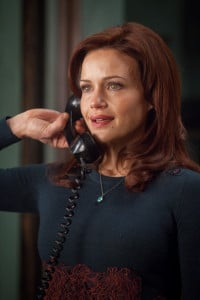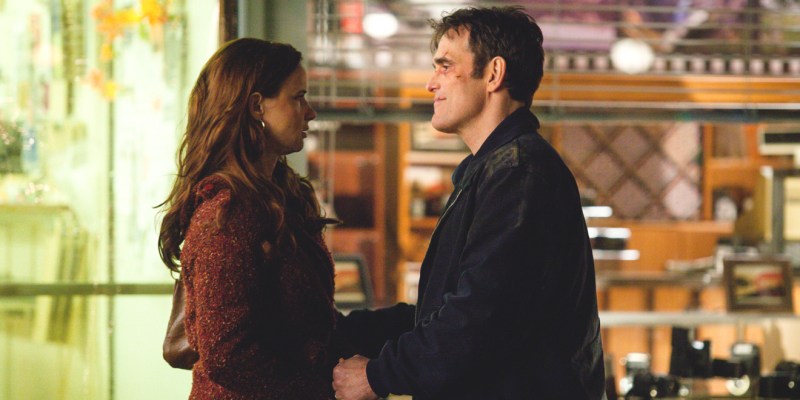Much like his show’s main character, Ethan Burke (Matt Dillon), the producer of FOX’s new miniseries “Wayward Pines,” M. Night Shyamalan, finds himself lost in a strange new world. For Special Agent Burke, it’s the sleepy titular Idaho town where he awakens after a car accident; for film screenwriter and director Shyamalan, of “The Sixth Sense” fame and “The Last Airbender” infamy, it’s behind the camera on a television set. While Burke attempts to escape from his new home, Shyamalan tries to adapt to his, hoping to translate his success at the box office into compelling entertainment on the silver screen. Unfortunately, like Burke, Shyamalan is a fish out of water, his aptitude with plot twists proving poorly suited to the unique demands of a ten-hour miniseries.
From the outset, “Wayward Pines” proudly displays Shyamalan’s distinctive signature. On the hunt for his missing partner and former lover, Kate Hewson (Carla Gugino), Special Agent Burke is blindsided by a truck and finds himself in Wayward Pines Hospital. The suspicious circumstances surrounding the incident, such as the unknown fate of his passenger and the disappearance of his belongings, combine with the disquietingly pleasant demeanors of the locals to cast an eerie shadow over the town. Dodging harassing law enforcement, a sinister nurse and a particularly pushy hotel clerk, Burke sets out to uncover the dark secrets of what he quickly learns might be his prison. The revelations are fast-paced, but, as the surprises pile up, they begin to feel increasingly mundane. Although the volume and absurdity of the twists rise throughout the series, they only push audience apathy higher: when the unexpected becomes expected, it ceases to be interesting. Instead of prefacing each storm with a suspenseful calm,“Wayward Pines” keeps the winds raging, ratcheting up the ridiculousness but never quite exciting its audience.

As Shyamalan’s maze of a plotline winds on, it becomes increasingly difficult to determine the prize to which the journey leads. Entertainment typically demands a response from its viewer, whether it be laughs, tears or the nervous sweat of suspense. “Wayward Pines,” however, seems content to simply present a series of events with no apparent purpose. Ostensibly, the show is a mystery, but a deliberate lack of foreshadowing before any of its major plot revelations trades any sense of anticipation for quickly diminishing shock value. Although it attempts to defy genre, the show’s occasional action scenes fail to thrill while its moments of heightened drama come across as forced and unimportant. This leaves the show feeling like a tale one’s senile, rambling grandfather might tell by the fireside, taking unexpected and often frustrating turns, the ultimate payoff of which is only the story’s end.
Much like the sleepy town itself, the characters of “Wayward Pines” feel superficial. Beyond the shimmering surface of plot twist after plot twist, there is little emotional or philosophical depth to explore. For the most part, characters are slaves to the plot rather than its drivers, following the course best suited to continuing the tale rather than acting believably or interestingly. Their conversations, while designed to broach difficult moral choices, are hampered by stilted dialogue and often contrived character relationships, in the end providing little more than a study guide for an Introduction to Philosophy course. The weakness of these support structures, crucial for the success of any show, forces “Wayward Pines” to rely almost entirely on the strength of its plot.

Unfortunately, the story is not strong enough to be the spine the show so desperately needs. Although some twists might inspire a jolt of surprise, overwrought and painfully direct explanations serve to make the audience suffer for almost being entertained. These verbal slaps in the face only accentuate the absurdity of the plot and bring attention to the story’s frustrating holes and loose ends. More significantly, the general premise — small town with a dark secret — feels overly familiar, especially for fans of David Lynch’s classic “Twin Peaks.” The comparison proves unflattering for the former, whose linear, mystery-less mystery looks even more clumsy compared to the latter.
Ultimately, “Wayward Pines” proves to be another letdown from once-promising M. Night Shyamalan, a director and producer who proves as unsuited to the harsh world of television as Ethan Burke is to the quiet doldrums of small-town life. Investing heavily in a plot that fails to compel and lacking the support of strong characters, the show joins the dozens of other post-“Lost” mysteries whose cases were probably better left unopened.
Contact Ryan Holmdahl at ryanlh ‘at’ stanford.edu.
